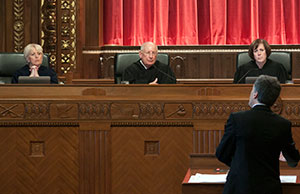Threats Made By Employee at Center of Case Before Supreme Court
Among Eight Cases To Be Considered on June 24 and 25

The Supreme Court’s late June cases involve an appeal from a fired 21-year employee of the Dublin schools seeking to seal his felony conviction, a property tax case from Cincinnati schools, and a challenge to environmental protection limits on waterway pollutants.

The Supreme Court’s late June cases involve an appeal from a fired 21-year employee of the Dublin schools seeking to seal his felony conviction, a property tax case from Cincinnati schools, and a challenge to environmental protection limits on waterway pollutants.
The Ohio Supreme Court will hear an appeal from a man convicted of making a terrorist threat after he talked about shooting other employees and bombing his Ironton workplace.
The case is one of eight the Supreme Court will consider during oral arguments on June 24 and 25.
David L. Laber shared with a co-worker his thoughts about shooting a manager and a human resources employee at Precision Directional Boring. He also talked about bringing explosives to the facility. After the co-worker informed management, the company fired Laber and notified local police. In 2012, a jury convicted Laber for making a terrorist threat, and the trial court sentenced him to three years in prison.
Laber argues that the state did not prove his comments had the specific intent to intimidate or coerce, as required by state law. He also contends that the statute permits the criminalization of speculative thoughts, in violation of the right to free speech in the U.S. Constitution.
The state counters that the jury concluded that Laber’s threats had the purpose to intimidate or coerce, and deference should be given to their determination.
Along with Laber v. State, the court will consider three other appeals on Tuesday, June 24. The Supreme Court will hear four cases on Wednesday, June 25. The court’s sessions begin at 9 a.m. each day at the Thomas J. Moyer Ohio Judicial Center in Columbus. The arguments will be streamed live online at sc.ohio.gov and broadcast live on The Ohio Channel.
Along with the brief descriptions below, the Office of Public Information today released summaries of the eight cases.
Cases for Tuesday, June 24
The court will hear arguments in Laber and these three cases during Tuesday’s session:
- A Central Ohio man who turned his life around after felony convictions during his youth seeks to seal his conviction record after receiving a gubernatorial pardon in Radcliff v. State. The former 21-year employee of the Dublin City Schools lost his job as a head custodian when a local newspaper published an article on school employees’ criminal records. At issue is whether courts may seal records according to their inherent power or need statutory authority to do so.
- In State v. Nolan, a man convicted in Portage County of shooting an acquaintance in the leg was found not guilty of attempted murder but guilty of attempted felony murder. The state argues that attempted felony murder is a viable crime in Ohio.
- A school district in Cincinnati City School District Board of Education v. Testa, Tax Commissioner of Ohio, et al. seeks to challenge a 2012 property tax exemption even though it did not object in the original application years before. The final determination on the exemption followed language inserted in a budget bill that specifically excepted the property in question. The school district asserts that it did not challenge the exemption earlier because it had no reason to at the time.
Cases for Wednesday, June 25
These four cases are on the court’s agenda for Wednesday’s session:
- An employee of a Valley City boring company hit another employee with a mini excavator in Judge Gall et al. v. State ex rel. Yeaples. The injured employee filed a lawsuit in Cuyahoga County against his Medina County employer and the co-worker, who lives in Cuyahoga County. The case was transferred to Medina County and then back to Cuyahoga County. The employer asserts that Ohio law does not recognize an intentional tort against a fellow employee, so the suit was filed improperly in Cuyahoga County.
- In Board of Commissioners of Fairfield County v. Nally, Director of Environmental Protection, the county contends the state has illegally promulgated rules by issuing limits on pollutant discharges into the waterways. The limits were then used as a basis for a permit at the Tussing Road wastewater treatment plant in Pickerington. The appellant also argues that due process was denied during the appeals process.
- In State v. Rogers, a man convicted in Cuyahoga County of receiving stolen property in cases involving two different victims argues that he should not have received consecutive sentences because his crimes were allied offenses. The state counters that because the cases involved separate victims, the crimes cannot be merged for sentencing.
- In Auto-Owners Insurance v. Granger, an insurance company seeks to overturn the appellate court’s decision, claiming it erred in applying the intentional acts exclusion in a breach-of-contract lawsuit. The case stems from the insurance company’s denial of a claim to defend or cover its Akron-area policyholders in a housing-discrimination lawsuit.


